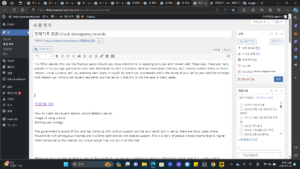1-2 What people who use the financial sector should pay close attention to is repaying principal and interest well. These days, there are many people in the younger generation who have attempted to start a business, develop themselves (lectures, etc.), resolve student loans, or invest (stocks, virtual currency, etc.) by receiving bank loans. It would be nice if you proceeded within the scope of your ability and paid the principal and interest well without delinquent payments, but the reality is that this is not the case in many cases.

How to check delinquent records, record deletion period
Image of using a bank
Banking use strategy
The government is aware of this, and has come up with various support policies as a result, but in reality, there are many cases where households with ambiguous incomes are in a blind spot and do not receive support. This is a story of people whose income level is higher when compared to the median, but whose actual lives are not at all like that.
When you are a college student or new to the workforce, you are very sensitive to having a delinquent record, even if it is only a small amount, but as you get older and the more years you spend at a company, you tend to become insensitive to a certain amount of money. Soon, you’ll feel like you can earn it again.
1. The number of days overdue should not be too long!
Simply paying a small amount of less than 100,000 won for 2-3 days will not have a significant impact on your personal credit rating. However, if delinquency accumulates even for a small amount, problems will definitely arise. First of all, delinquency can be divided into ‘short-term’ and ‘long-term’.
1) Short-term delinquency
According to data changed after January 14, 2019, short-term delinquency refers to less than 90 days of non-payment based on the normal repayment date. A record will be left when an amount over 300,000 won is overdue for more than 30 days. If recorded frequently, it can have a significant negative impact.
2) Long-term overdue payments
This refers to when the amount of 1 million won or more is overdue by more than 90. This can have a significant impact on your credit score as it can be recorded as a default.
Image of a man counting money
Criteria for classification of delinquent records
2. Please observe the contract date carefully.
It is important to manage it well so that no records are left behind, whether in the short or long term. If delinquency is frequent and the amount is large, this information will be shared with the credit rating group and financial institutions. If more than 100,000 won is spent over 5 days based on banking business days, information is shared with the financial sector.
Since information is received from each financial institution, the person in question is recognized as “a person with a high probability of not receiving money even if lent.” This will soon become your personal credit score. Therefore, if you need a large sum of money in the future, you may not be able to receive help even if you go to the bank.
Image of thinking while looking at household account book
Image of thinking while looking at household account book
3. I paid the full amount, will there be a record?
If a delinquency has already occurred and the record has been left and shared, it will take some time to be deleted. Even if you pay both principal and interest well, it does not disappear right away. In the short term, the record remains for 1 year, and in the long term, it lasts for 5 years, and the record affects your credit score.
Records are kept and shared for 1, 3, or 5 years depending on the amount and period, so if you want to receive a loan, it is always recommended to proceed with more than you can afford. Additionally, if the loan was for starting a business, etc., please think carefully about the business plan and fund management plan, and also specify the profit model.
4. Loss of term profits
The financial sector may demand repayment of the entire principal amount from creditors who are delinquent due to failure to repay by a certain date, even though the due date has not yet arrived. It is important to keep in mind that if a loss of interest is due, additional interest may be added for overdue payments.
In addition, for those with a history of two or more late payments in the past five years, the short-term delinquency standards based on business days may be applied more tightly.
Today, we learned about short-term and long-term delinquency, record deletion periods, and loss of overdue profits. If many people see this, they will only think about ‘loans’, but the same applies to other tax-related aspects such as communication fees, fines, four major insurances, local taxes, and income tax. Therefore, it is important to always keep a portion of your income intact and develop the habit of paying it well.
You can check your delinquency record at Nice Keeper or KCB All Credit.